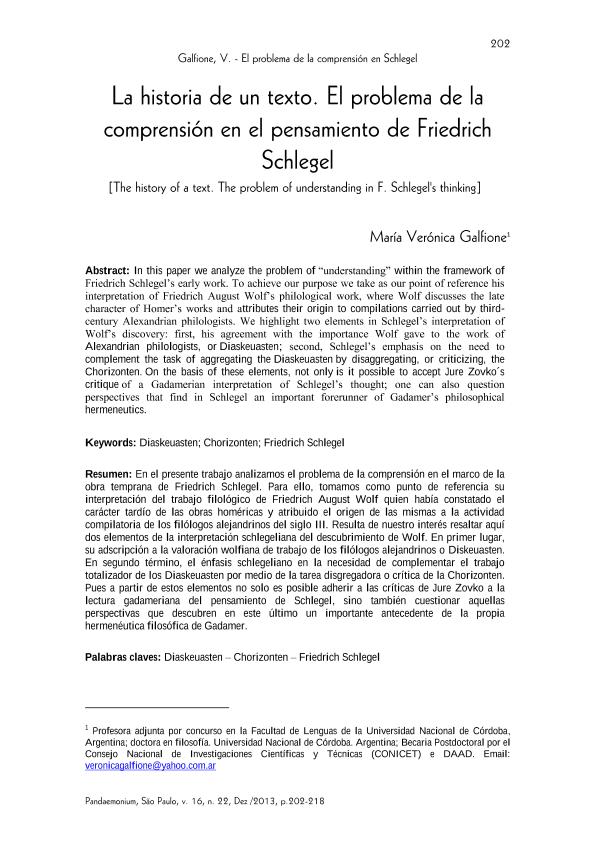Mostrar el registro sencillo del ítem
dc.contributor.author
Galfione, María Verónica

dc.date.available
2016-12-22T21:30:49Z
dc.date.issued
2013-12
dc.identifier.citation
Galfione, María Verónica; La historia de un texto. El problema de la comprensión en el pensamiento de Friedrich Schlegel; Universidade de Sao Paulo; Pandaemonium Germanicum; 16; 22; 12-2013; 202-218
dc.identifier.issn
1414-1906
dc.identifier.uri
http://hdl.handle.net/11336/9996
dc.description.abstract
En el presente trabajo analizamos el problema de la comprensión en el marco de la obra temprana de Friedrich Schlegel. Para ello, tomamos como punto de referencia su interpretación del trabajo filológico de Friedrich August Wolf quien había constatado el carácter tardío de las obras homéricas y atribuido el origen de las mismas a la actividad compilatoria de los filólogos alejandrinos del siglo III. Resulta de nuestro interés resaltar aquí dos elementos de la interpretación schlegeliana del descubrimiento de Wolf. En primer lugar, su adscripción a la valoración wolfiana de trabajo de los filólogos alejandrinos o Diskeuasten. En segundo término, el énfasis schlegeliano en la necesidad de complementar el trabajo totalizador de los Diaskeuasten por medio de la tarea disgregadora o crítica de la Chorizonten. Pues a partir de estos elementos no solo es posible adherir a las críticas de Jure Zovko a la lectura gadameriana del pensamiento de Schlegel, sino también cuestionar aquellas perspectivas que descubren en este último un importante antecedente de la propia hermenéutica filosófica de Gadamer.
dc.description.abstract
In this paper we analyze the problem of “understanding” within the framework of Friedrich Schlegel’s early work. To achieve our purpose we take as our point of reference his interpretation of Friedrich August Wolf’s philological work, where Wolf discusses the late character of Homer’s works and attributes their origin to compilations carried out by thirdcentury Alexandrian philologists. We highlight two elements in Schlegel’s interpretation of Wolf’s discovery: first, his agreement with the importance Wolf gave to the work of Alexandrian philologists, or Diaskeuasten; second, Schlegel’s emphasis on the need to complement the task of aggregating the Diaskeuasten by disaggregating, or criticizing, the Chorizonten. On the basis of these elements, not only is it possible to accept Jure Zovko´s critique of a Gadamerian interpretation of Schlegel’s thought; one can also question perspectives that find in Schlegel an important forerunner of Gadamer’s philosophical hermeneutics.
dc.format
application/pdf
dc.language.iso
spa
dc.publisher
Universidade de Sao Paulo

dc.rights
info:eu-repo/semantics/openAccess
dc.rights.uri
https://creativecommons.org/licenses/by-nc-sa/2.5/ar/
dc.subject
Diaskeuasten
dc.subject
Chorizonten
dc.subject
Friedrich Schlegel
dc.subject
Hermeneutica
dc.subject.classification
Otras Humanidades

dc.subject.classification
Otras Humanidades

dc.subject.classification
HUMANIDADES

dc.subject.classification
Otras Humanidades

dc.subject.classification
Otras Humanidades

dc.subject.classification
HUMANIDADES

dc.title
La historia de un texto. El problema de la comprensión en el pensamiento de Friedrich Schlegel
dc.title
The history of a text. The problem of understanding in F. Schlegel's thinking
dc.type
info:eu-repo/semantics/article
dc.type
info:ar-repo/semantics/artículo
dc.type
info:eu-repo/semantics/publishedVersion
dc.date.updated
2016-12-19T18:05:04Z
dc.identifier.eissn
1982-8837
dc.journal.volume
16
dc.journal.number
22
dc.journal.pagination
202-218
dc.journal.pais
Brasil

dc.description.fil
Fil: Galfione, María Verónica. Universidad Nacional de Córdoba; Argentina. Consejo Nacional de Investigaciones Científicas y Técnicas; Argentina
dc.journal.title
Pandaemonium Germanicum

dc.relation.alternativeid
info:eu-repo/semantics/altIdentifier/url/http://www.fflch.usp.br/dlm/alemao/pandaemoniumgermanicum/site/
dc.relation.alternativeid
info:eu-repo/semantics/altIdentifier/url/http://ref.scielo.org/dkx9br
dc.relation.alternativeid
info:eu-repo/semantics/altIdentifier/url/http://www.redalyc.org/articulo.oa?id=386635474011
dc.relation.alternativeid
info:eu-repo/semantics/altIdentifier/url/https://doaj.org/article/60343721c78b493caf014b9434e125fc
dc.relation.alternativeid
info:eu-repo/semantics/altIdentifier/url/http://dx.doi.org/10.1590/S1982-88372013000200011
Archivos asociados
